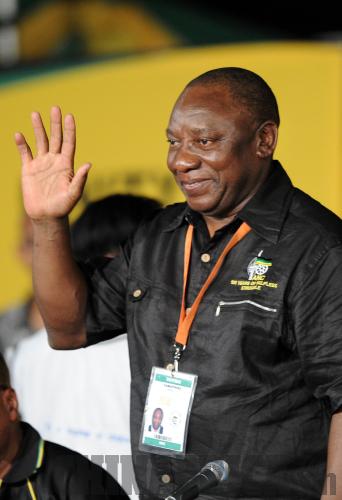|
 |
|
Newly elected Deputy President of the African National Congress (ANC) Cyril Ramaphosa celebrates his victory during the 53rd National Conference of the ANC on December 18, 2012 in Mangaung(AFP PHOTO / STEPHANE DE SAKUTIN) |
In December 2012, as corporate South Africa closed down for the holiday season, more than 4,500 members of the ruling African National Congress (ANC) descended on the city of Mangaung to elect their leadership for the next five years, and ultimately determine the future of South Africa's development.
One of two important events in the ANC calendar (the other being the party's policy conference), the meeting in Manguang, the capital of Free State, generally met expectations in terms of leadership and policy trends. The meeting was also characterized as "less rowdy" than that held in Polokwane in 2007, when President Jacob Zuma took the reins of the ANC from then President Thabo Mbeki.
Since his victory in the 2009 general election, President Zuma has arguably done very little to accelerate South Africa's societal development, which still faces serious socio-economic challenges almost two decades after the first ANC electoral victories.
Internal division
South Africa has been plagued by declining social cohesion, high unemployment, rising inequality and increasing frustration among disenfranchised groups. In recent months this has translated into violent protests in the mining, agriculture and transport sectors, and has negatively impacted the nation's GDP growth.
Furthermore, the ANC itself has become increasingly divided, with party infighting, corruption, populism, threats of nationalization, a lack of governance and the general ineffectiveness causing people to lose confidence in the organization. It lacks effective leadership and its efforts to foster economic development and advancement in South Africa have been disappointing. This has contributed to a lack of confidence in South Africa among foreign investors, which was recently reflected by the nation's credit rating being downgraded by Moody's, Standard & Poor's and Fitch.
But not long ago the country presented a united and promising image to the world, successfully hosting the FIFA World Cup in 2010, followed by South Africa's 2011 initiation into the club of rapidly growing and thriving "BRIC" economies, now known as the "BRICS" since South Africa's inclusion. Despite great potential, South Africa has struggled to live up to expectations.
|